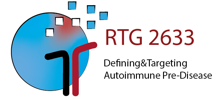MD B14: Selective depletion of antigen-specific autoantibodies by targeted degradation
Autoantibody-mediated autoimmune diseases, such as bullous pemphigoid (BP), pose a significant clinical burden due to their chronic nature and reliance on broad immunosuppression. BP is caused by autoantibodies targeting structural proteins of the skin, primarily BP180, leading to inflammation and blistering. Current therapies, including corticosteroids and B-cell depletion (e.g., rituximab), often induce remission but are associated with considerable side effects and delayed therapeutic response.
This project investigates a novel, targeted treatment strategy using engineered Fc-fusion proteins called Seldegs (Selective Degraders). Seldegs consist of disease-specific autoantigens (e.g., BP180) fused to modified Fc domains that bind the neonatal Fc receptor (FcRn) in a pH-independent manner. This promotes selective internalization and lysosomal degradation of pathogenic autoantibodies without affecting non-pathogenic IgG.
A BP180-specific Seldeg was successfully developed, expressed, and validated in preliminary work. The aim of this project is to evaluate its therapeutic effect in humanized mouse models expressing human FcRn. Key experiments will determine whether Seldegs can selectively reduce BP180 autoantibody levels in vivo and accelerate disease control compared to conventional therapies. This approach could enable rapid symptom relief, minimize side effects, and potentially alter disease course. Moreover, it provides mechanistic insight into IgG recycling and opens new perspectives for the early, targeted treatment of autoimmune diseases even before clinical onsett

- Projects
- 1st Generation
- 2nd Generation
- A: Defining Autoimmune Pre-Disease
- B: Targeting of Autoimmune Pre-Disease
- Associated projects
- Medical doctoral researcher projects
- Concluded projects
- Medical doctoral researchers
- MD A20: Molecular and cellular characterization of aging effects in liver and plasma in mice
- MD A21: Kinase activity profiling of autoantibody-mediated angiotensin II type 1 receptor signaling in endothelial and immune cells
- MD A22: Systemic lupus erythematosus and fibromyalgia syndrome – movement as a biomarker for pain perception
- MD A24: Unveiling PTX3: A novel biomarker in the pathogenesis and progression of bullous pemphigoid
- MD B8: Deciphering the signaling events in desmoglein 1 and 3 antibody-induced pathology to investigate possible impacts for the onset of new autoimmune reactions
- MD B9: Testing substances influencing the protein biosynthesis in the human skin organ culture model for pemphigus vulgaris
- MD B10: Testing ion channel inhibitors in the human skin organ culture model for pemphigus vulgaris
- MD B11: Nutritional treatment study to improve inflammatory IgG Fc glycosylation
- MD B12: Resting heart rate as a prognostic marker for fatigue in primary Sjoegren's syndrome
- MD B13: Deciphering the signaling events in BP180 antibody-induced pathology to investigate possible impacts for the onset of new autoimmune reactions
- MD B14: Selective depletion of antigen-specific autoantibodies by targeted degradation
- Medical doctoral researchers
Medical doctoral researcher

Participating Researcher


Mentor



